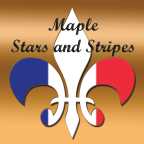Podcast: Play in new window | Download
Subscribe: RSS
 There are so many ways to spell certain sounds in French that it sometimes becomes difficult to even recognize a name as the one for which you are searching. In episode 4 of Maple Stars and Stripes (MapleStarsandStripes.com/4), we take a look at the many ways of spelling the long O sound and why it’s not always a good idea to rely on a Soundex search when trying to find an ancestor in an online database.
There are so many ways to spell certain sounds in French that it sometimes becomes difficult to even recognize a name as the one for which you are searching. In episode 4 of Maple Stars and Stripes (MapleStarsandStripes.com/4), we take a look at the many ways of spelling the long O sound and why it’s not always a good idea to rely on a Soundex search when trying to find an ancestor in an online database.
In episode 2 (MapleStarsandStripes.com/2), we covered dit names. Here we look at other types of name variations that can also make it difficult to find a hard-to-locate ancestor.
Maple Stars and Stripes is now available on iTunes (MapleStarsandStripes.com/itunes), Stitcher (MapleStarsandStripes.com/stitcher), and in the Windows Phone Store. Also please consider liking us on Facebook (www.facebook.com/maplestarsandstripes).
Enjoy listening!




You have wonderful suggestions in these podcasts, especially for those who are unfamiliar with French, either spoken or written. I have known French (Canadian French from the 17th and 18th centuries) that I heard from my earliest moments of life. I read and understand it, although I have not had much opportunity to write it or speak it in recent years. I have done extensive research in colonial and notarial and other original documents.
One comment in this podcast needs revision:
“Also, the English names of captives and native Indian names were difficult to pronounce in French. Therefore, Farnsworth became Phaneuf. The digit 8 is placed in Indian names that contain a sound similar to huit, the French word for the number 8.”
Actually, the symbol that looks like /8/ is a digraph for the sound /ou/ or of English /w/ before a vowel. On the original handwritten documents, it is a combination of two Greek letters that look like a /u/ on top of an /o/. I can send you examples in a Word document with the images in digital form. Let me know where to send this, if you are interested. PRDH transcribes it as /ou/ in every instance in its certificates, but before a vowel it takes the sound of English /w/.
Suzanne Boivin Sommerville
of the French-Canadian Heritage Society of Michigan
I have posted a link to your podcasts on our Facebook page
Suzanne, thanks for the clarification. Please send the examples to maplestarsandstripes [at] gmail [dot] com and I’ll put them in the show notes.
See “The Greek digraph representing the sounds /ou/ or English /w/ before a vowel” by Suzanne Sommerville for an explanation of the native pronunciation.
Great podcast! My last name is Thiffault (yes, with that long O sound), and I am a member of the family association Les Tifault d’Amérique (http://tifault.org/qui-sommes-nous/). The association has been researching the descendants of Jacques Tifault and Marie-Anne L’Écuyer (married in 1687 in New France) over the last 30 years, and found at least 37 ways of spelling our family name: Tifau, Tifaud, Tifault, Tifaut, Tifaux, Tifeau, Tifeaut, Tifeaux, Tiffau, Tiffaud, Tiffaul, Tiffauls, Tiffault, Tiffaus, Tiffaut, Tiffauts, Tiffaux, Tiffeau, Tiffeault, Tiffeaux, Tiffiau, Tifo, Tiffo, Thifau, Thifaud, Thifault, Thifaut, Thifaux, Thifeau, Thifeaut, Thifeaux, Thiffaut, Thiffault, Thiffeau, Thiffeault, Thyfault, Tefoe. As you may have guessed, that last variation is only found in the US. I think your podcast will not only help Americans find their French-Canadian ancestors, but French-Canadians find their American cousins! Keep up the good work!
Hi Christine, If there were a prize for most name variations, I believe right now you’d be holding the trophy!!! You make a very good point at the end. I have a g-g-grandfather who buried his wife in Quebec and then moved to Massachusetts with a couple of his children. I’ve often wondered if other descendants have traced their line back to this couple and are now wondering, “What happened to pépère?”